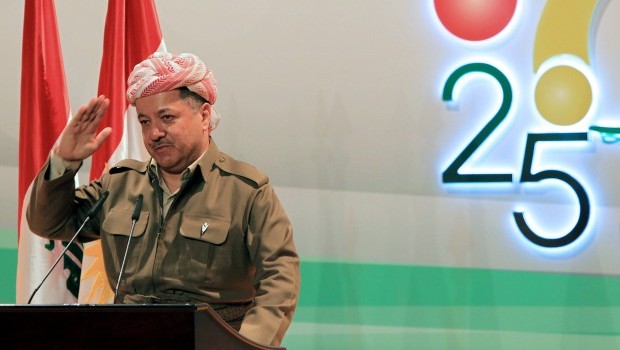
Massoud Barzani, the head of the Kurdistan regional government, addresses a conference on “recognizing the Kurdish genocide” in Erbil on March 14, 2013. (AFP PHOTO/ ALI AL-SAADI)
Baghdad and London, Asharq Al-Awsat—The ongoing dispute between the Kurdistan Regional Government (KRG) and Baghdad appeared to widen this week when a leading Kurdish political figure is reported to have confirmed that KRG President Massoud Barzani is preparing for independence for Kurdistan.
Kurdistan Pas News Agency quoted the head of the Goran Movement, Nawshirwan Mustafa, as confirming that Barzani had told him that he would seek to announce an independent state of Kurdistan within two years. The contentious claims have created controversy across Iraq ahead of the country’s third parliamentary elections, scheduled for the end of April.
A senior Kurdish political figure, speaking to Asharq Al-Awsat on the condition of anonymity, confirmed the reports on Wednesday. The source affirmed that during a meeting at the Goran Movement’s Suleimaniya-based headquarters, Mustafa had said that a potential independent Kurdish state “was discussed as an option.”
According to the source, the Goran Movement “will support the declaration of an [independent Kurdish] state so long as there has been sufficient preparation, including in terms of the economy and institutions,” Mustafa said.
“We do not want Kurdistan to find itself in a situation similar to Northern Cyprus, whose continued existence is mainly based on Turkish support.”
“We do not want to forfeit the gains the region has achieved so far, either,” the Goran leader added.
Baghdad and the KRG remain locked in a political and economic crisis over the 2014/15 budget, with Erbil demanding a greater share of the national budget. Speaking on the sidelines of the crisis and against Iraqi criticisms over Kurdish attempts to unilaterally export oil, Barzani has threatened to take “unexpected steps if the [Baghdad] government and its leader, [Prime Minister] Nuri Al-Maliki, continue damaging the prestige of the Kurds.”
In comments to Asharq Al-Awsat, State of Law Coalition MP Ali Al-Shallah blasted Barzani for “acting as if he is more important than the Iraqi state,” adding that Barzani’s “ambitions will be met with many troubles, most prominently from the US . . . which is strongly opposed to exporting oil without the approval of the federal government.”
“If Barzani insists on declaring an [independent] state, it will be within the borders of the state on April 9, 2003 [fall of Baghdad]. That is, excluding Kirkuk and the disputed areas,” he added.
Speaking to Asharq Al-Awsat, Iraqiya bloc MP Talal Hassan Al-Zoubai said: “Iraq today is closer to a confederation rather than a federal government.”
“A federal government cannot order the [Kurdistan] region to do anything . . . the problem is that the Iraqi constitution gives precedence to the regions and the provinces over the central government—a thing which made Iraqi Kurdistan develop on all levels so that it became more significant than the center,” he continued. “Iraq today is made up of regions, the Kurds being most powerful on all levels, including the Peshmerga’s military strength, economy and investment.”
Burhan Mohammed Faraj, an MP from the Kurdistan Coalition, told Asharq Al-Awsat that “Kurds willingly chose to unite with the Arabs within the framework of a unified Iraq,” saying that “the only way to ensure Iraq’s unity is by showing commitment to and fully implementing the Iraqi constitution.”

Trackbacks/Pingbacks